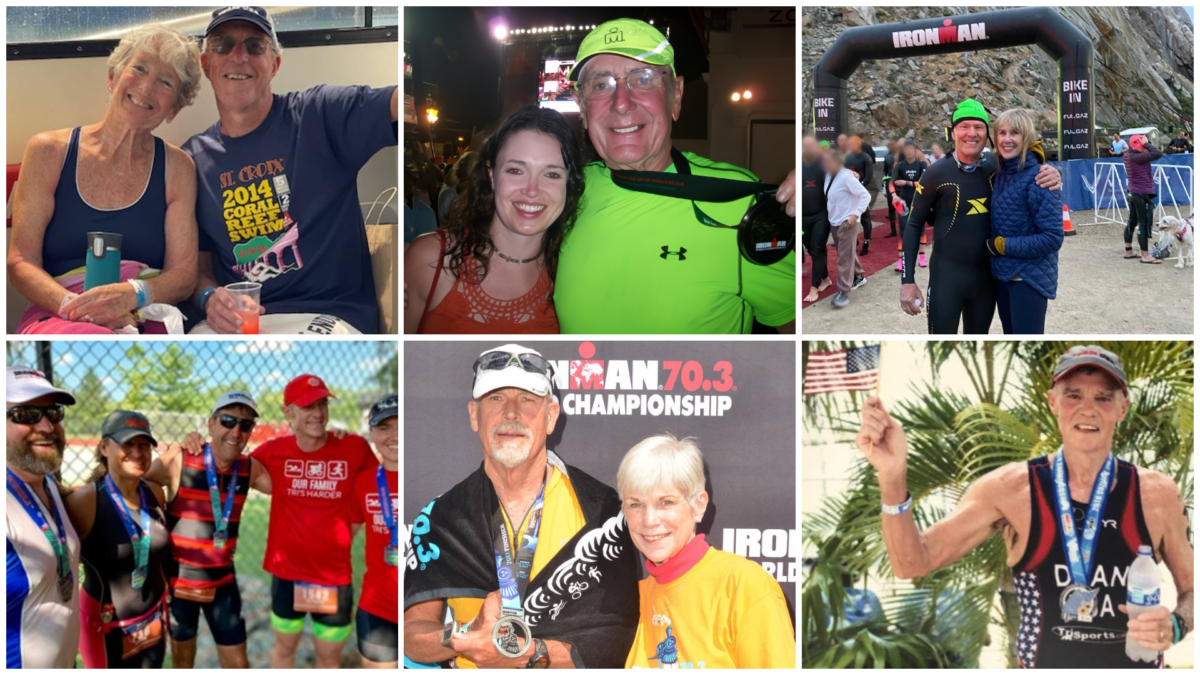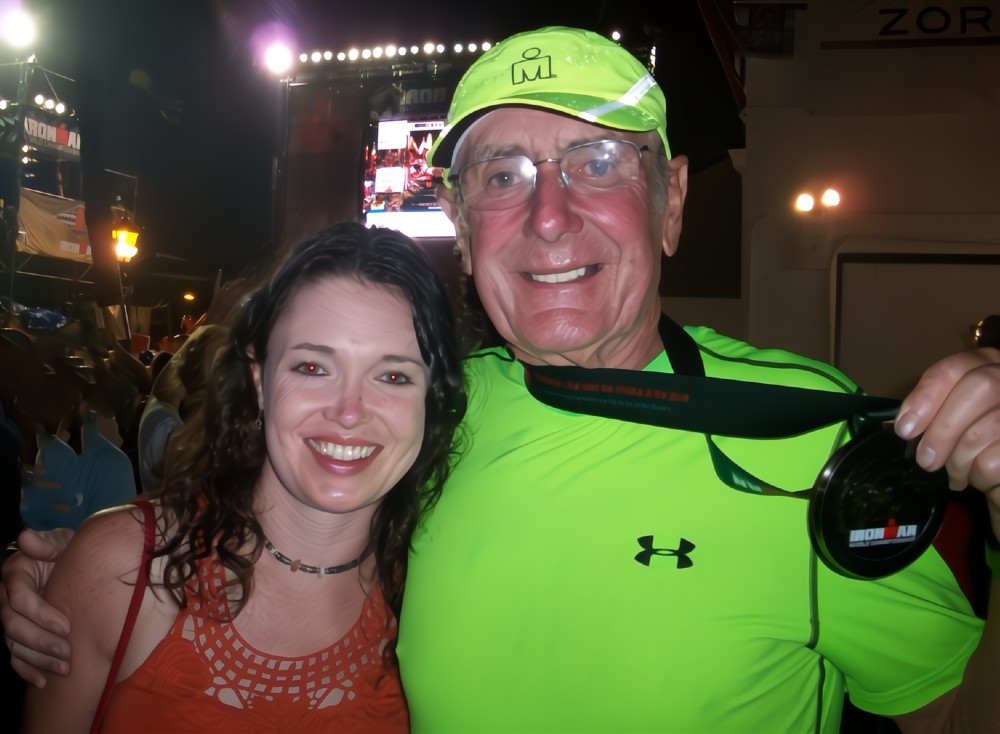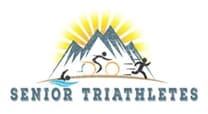Start Here: Your Guide to Triathlon After 50

Welcome!
Welcome to SeniorTriathletes.com, a website dedicated to beginner and experienced triathletes aged 50 and over that I started in 2016. If you’re over 50 and curious about doing a triathlon — or already racing and looking to improve — you’re in the right place.
Before I go any further, I want to shout out a loud “Congratulations” for being here. I admire you for paying attention to your physical well-being.
My name is Terry VanderWert. I started triathlon at age 58, and together with my wife, Joy (who volunteered at many races), we completed triathlons in all 50 states. Along the way, we discovered new adventures, met inspiring people, and proved that triathlon isn’t just for the young — it’s for anyone willing to start.
If you’re wondering, “Can I really do this at my age?” — the answer is YES.
Our Story
When the nest became empty, Joy and I were looking for something new — something that would challenge us and bring us closer together. Triathlon became that adventure.
I’ve shared our journey in my book, Triathlon Adventures Across America, which tells the story of racing across the country, the people we met, and the lessons learned.
But this site goes further — it’s here to help YOU start and succeed in your own triathlon journey.

How to Get Started With Triathlon After 50
Here are the key areas to focus on when training as a senior triathlete, along with resources from this site to help you:
🎯Why Triathlon After 50?
Triathlon can help you:
- Improve your health and fitness.
- Meet new friends and become part of a supportive community.
- Discover new places and adventures.
👉 Read: 15 Reasons for Those 50 and Older to Do Triathlons
🏁First Steps
Start with realistic goals, choose a local race, and don’t worry about being “fast.” The biggest win is showing up at the start line.
👉 Read: “Training for My First Triathlon”- Liz Lawson’s Story
“There was nothing like coming to the finish line and seeing a big group of the mentors, now volunteering at the event. cheering us through and presenting our medal.”
Liz Lawson after completing her first triathlon
💪Training for Senior Triathletes
Training is different after 50 — but it’s absolutely doable. Focus on:
- Consistency over perfection.
- In addition to training for swimming, biking, and running, older triathletes, whether new to the sport or a life-long participant, must also include in their plan:
- Strength Training — as Mark Allen emphasized in Strength Training for Triathletes, strength work is essential for performance and injury prevention.
- Rest & Recovery — your body rebuilds during rest, not just training days.
- Nutrition & Hydration — fueling properly before, during, and after workouts is just as important as the training itself.
⏱ Training
Triathlon Training:
- Six Principles of Triathlon Training for Seniors
- How To Make Triathlon Training Senior-Specific
- Strength Training: My Experience with Mark Allen’s Strength Training for Triathletes
- For answers to common questions, checkout the Ask Our Coaches series
😴Rest & Recovery
🥗Nutrition & Hydration
Senior triathletes face unique challenges, but proper nutrition and hydration can be the key to peak performance and a long, healthy career in the sport. Drawing on expert advice from sources like registered dietitian Sakiko Minagawa and sports nutritionist Dr. Nancy Clark, as well as trusted organizations, the articles on SeniorTriathletes.com linked below provide crucial insights.
Learn why older athletes require more protein and specific vitamins to build and maintain strength, and discover the vital role of electrolytes in keeping your cells hydrated, preventing cramps, and sustaining energy during training and races. By understanding these fundamentals, you can fuel your body effectively and unlock your full potential on your triathlon journey.
- Nutrition: What Masters Athletes Need To Know About Nutrition
- Hydration: Electrolytes: Vital for Hydration of Senior Triathletes
- More on this topic: Nutrition for Senior Endurance Athletes
Mental Preparation
TriDot triathlon coach and senior triathlete Kurt Madden has learned that training our mind to embrace discomfort is an important way to improve triathlon performance. “When we are uncomfortable, there is a good thing that happens: we grow,” says Coach Madden. For more about the importance of mental toughness in triathlon, read How Important Is Mental Toughness For Triathlon?
How to Create Your Own Training Plan
Instead of a one-size-fits-all approach, a successful triathlon journey begins with a training plan that works for you. The key is to build a routine that is sustainable, enjoyable, and tailored to the unique needs of a more mature athlete. By understanding the core principles of training, you can craft a plan that helps you build a strong foundation for your first race.
Three Core Principles of Smart Training
- Consistency Over Intensity: Regularity is your greatest asset. It’s far more effective to complete three consistent workouts a week than to cram in one exhausting, high-intensity session. Consistency builds endurance, reinforces muscle memory, and reduces the risk of injury.
- Progressive Overload: As your body adapts, you’ll need to gradually increase the duration or intensity of your workouts. This doesn’t mean you have to go all out every time—it can be as simple as adding a few more minutes to your weekly run or a couple of laps to your swim.
- Prioritize Rest and Recovery: For older athletes, recovery is where the magic happens. Your body repairs and strengthens itself during rest. Schedule at least one full day of rest each week, and don’t be afraid to take an extra day off if you feel fatigued.
Sample Training Plan
Based on the real-world experiences of senior triathletes like me, Liz Lawson, and Joe Simonetta, a balanced weekly routine for beginners can look something like this. The key is to integrate the three disciplines, including swim-to-bike and bike-to-run transitions, with adequate rest and recovery.
According to sports medicine research, the a practical weekly workout plan for an older triathlete should emphasize aerobic base, moderate intensity, rest, flexibility, and strength work tailored for injury prevention and sustainable progress. A safe and effective training plan will include:
- At least two low-impact aerobic sessions, a dedicated strength day, one brick session, and two rest/recovery-oriented days.
- Flexibility and balance sessions help prevent injuries and support recovery.
- Being on the lookout for excessive fatigue; adjust intensity and rest as needed. Consider a “2-weeks build/1 week recovery” approach for more advanced athletes.
- Attention to technique, especially for the swim.
- Having fun. Here is where joining group workouts or masters programs may be especially helpful.
- A focus on safety and injury prevention. Modify or substitute any workout as necessary due to soreness or a need for additional recovery.
Based on these, here is a general structure for a weekly workout schedule:
Find a Plan that Fits You
While the principles above are a great starting point, a plan tailored to your fitness level can help you achieve your best performance. We recommend exploring free plans from reputable organizations, such as USA Triathlon, or pickup a copy of Train to Tri: Your First Triathlon written by experts with USA Triathlon. These plans can serve as a valuable blueprint for your training.
However, before you start one of these general, free plans, listen to triathlon coach Kurt Madden’s advice in How To Make Triathlon Training Senior-Specific. As a senior triathlete, Coach Madden knows how to adapt training plans designed for all ages to the unique differences of the older athlete.
🚲Gear for Senior Triathletes: Your Checklist
Getting started in triathlon doesn’t require a second mortgage. You can begin with minimal gear and invest more as your passion for the sport grows. Here’s a two-tiered checklist to help you get started, focusing on the needs of athletes over 50.
BASIC: The Bare Essentials
This checklist covers what you absolutely need to complete your first sprint or super sprint triathlon safely and comfortably.
- Swim:
- Swimsuit: A one-piece for women, or jammers/briefs for men.
- Goggles: A comfortable pair that fits well and doesn’t leak.
- Swim Cap: Often provided by the race, but having your own is good for training.
- Bike:
- Bicycle: You can use any roadworthy bike—a road bike, hybrid, or even a mountain bike will work for your first race. Focus on comfort and fit.
- Helmet: This is non-negotiable. A CPSC-certified helmet is required for all triathlon races.
- Running Shoes: You can wear your running shoes on the bike for your first race, clipped pedals are a future goal.
- Water Bottle: Essential for hydration during the ride.
- Run:
- Running Shoes: A comfortable, well-fitting pair of running shoes is your most important piece of gear. Consider being fitted at a running specialty store.
- Socks: A pair that wicks moisture to prevent blisters.
- Race Day:
- Tri Suit: While a tri suit is convenient, for your first race, a swimsuit for the swim and comfortable athletic clothes for the bike and run will suffice.
- Race Belt: An elastic belt to hold your race bib number, so you don’t have to pin it to your shirt.
- Sunscreen: Protect your skin, especially if you’re fair-skinned. However, choose a product based on natural SPFs such as Badger Sport mineral sunscreen.
- Nutritional Gels/Chews: These are not necessary for a sprint or shorter distance race, but you may want to use them during longer training sessions.
NEXT LEVEL: Upgrading Your Gear
Once you’ve fallen in love with the sport, you may want to upgrade to gear that can improve performance, comfort, and safety.
- Swim:
- Wetsuit: Required for open water swims in colder temperatures and can also provide buoyancy, making swimming easier.
- Anti-Fog Spray: For your goggles.
- Bike:
- Road Bike: A lighter, more efficient bike designed for speed and endurance.
- Padded Bike Shorts or Tri Shorts: Provides comfort on longer rides.
- Bike-Specific Shoes and Clipless Pedals: Allows you to generate more power and ride more efficiently.
- Cycling Sunglasses: Provides eye protection from sun, wind, and debris.
- Repair Kit: A small bag with tire levers, a spare tube, and a CO2 inflator or small pump.
- Run:
- Race-Specific Running Shoes: Lighter shoes designed for speed on race day.
- Elastic Laces: Also known as “lock laces”, these reduce the bike to run transition time.
- Running Hat/Visor: Shields your face from the sun.
- Technology & Accessories:
- GPS Watch: A multi-sport watch to track your swim, bike, and run metrics.
- Heart Rate Monitor: Helps you train in the correct zones for your goals.
- Bike Computer: Tracks speed, distance, and other metrics in real-time.
- Transition Towel: A bright towel to easily identify your spot in the transition area.
- Recovery Aids: A foam roller and massage gun are helpful for speeding recovery during your training phase.
Do I Need a Coach?
The Senior Triathletes website provides examples of many successful triathletes who have self-trained on their own or with a group and many who have trained with a coach. Some have used both.
Most stories of other senior triathletes in the Our Stories section describe their training schedule and how they chose the approach they did. Many are also more than happy to answer questions from others in our community.
Also, read the following articles and, if you are still not sure, talk with one or more coaches to find the right way for you.
- Self training: Read Book Review – Train to Tri: Your First Triathlon
- Coach training:
- Read How A Coach Can Help Throughout Your Triathlon Journey
- Read Why Should Seniors Use A Triathlon Coach?
- Become familiar with Our Coaches by reading about them and their answers to questions from other senior triathletes. You can also contact them by email.
Not everyone needs a coach but everyone can find a reason to hire a coach.
Dr. Jeff Sankoff, The Tri Doc in Why Should Seniors Use A Triathlon Coach?
The Language of Triathlon
To help jumpstart learning about triathlon, read the Glossary.
👥Inspiration From Other Senior Triathletes
You’re not alone — many in their 50s, 60s, 70s, and even 80s are racing and thriving. The following stories will inspire and remind you that age is no barrier to triathlon.
👉 Read:
- Five Things I Learned Starting Triathlons After 50
- Joe Simonetta Brings Home Gold At 2025 National Senior Games
Stories of Other Senior Triathletes

Ready to Begin?
📖 Read My Book: Triathlon Adventures Across America
📰 Subscribe to our monthly Newsletter for encouragement, tips, and new stories.
🎽 Find a training plan that works for you.
🏃♂️Register for your first, or next, triathlon.
Final Encouragement
Triathlon after 50 isn’t about being the fastest. It’s about health, adventure, and community. If I could start at 58, you can start at your age too.
Your first step? Pick a race, start training smart, and enjoy the journey. We’ll be with you every step of the way.
⚠️Disclaimer
Please consult your doctor before beginning any new training program. Your health and safety come first.
❓What Have Me Missed?
Is there some specific information you are looking for but not found here? Let us know in the Comments below. We’ll get right on it.
Comments: Please note that I review all comments before they are posted. You will be notified by email when your comment is approved. Even if you do not submit a comment, you may subscribe to be notified when a comment is published.

Ineresting to have come across this. I started doing triathlons in 2000 at age 62. By God’s grace , still doing them now with Kurt as my present coach. I’ve learned a few things along the road, about triathlon and about life. Keep up your effirts in helping old folks achieve greatness.
Thanks for your comment John. Let me know if you would like to have your triathlon story published on SeniorTriathletes.com and/or can contribute to the Sample Training Plan. Best wishes for a long triathlon career.